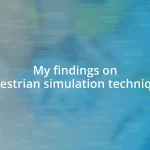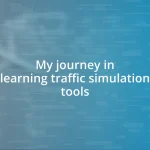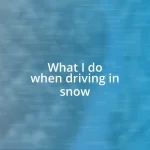Key takeaways:
- Driving fatigue involves diminished mental sharpness, not just sleepiness; recognizing signs like yawning and lack of focus is crucial for safety.
- Effective hydration and nutritious snacks can significantly boost energy levels during long drives, while regular breaks help rejuvenate both body and mind.
- Engaging techniques such as upbeat music, conversations, and using navigation technology can enhance alertness and maintain concentration on the road.

Understanding driving fatigue
Driving fatigue is a complex issue that affects many of us during long trips. I remember a time when I pushed through hours on the road, thinking I could manage it, only to find my concentration slipping. Have you ever felt that creeping sense of lethargy as the scenery becomes a blur? It can sneak up on you, making every mile feel like a chore.
When we talk about driving fatigue, it’s important to acknowledge that it’s not just about feeling sleepy; it’s about diminished mental sharpness. That’s a lesson I learned the hard way on a late-night drive. I replayed my favorite playlist, yet I could sense my decision-making skills faltering. It’s startling to realize how quickly fatigue can lead to increased reaction times and poor judgment—two critical factors for safe driving.
Understanding the signs of fatigue is essential for everyone behind the wheel. For me, it often starts with a heavy eyelid or a slight slump in posture. Have you noticed similar signs in yourself? It’s crucial to listen to your body. Knowing when to take breaks isn’t just advice; it’s a lifeline for safe driving.

Recognizing signs of drowsiness
Recognizing the signs of drowsiness can be crucial for maintaining safety on long drives. I’ve found that yawning frequently is one telltale sign that I need to reassess my alertness. It’s almost as if my body is sending me a gentle warning, reminding me that I might be running low on energy.
Another indication of drowsiness I’ve encountered is a lack of focus on the road. Sometimes, I notice my mind wandering to memories or daydreams instead of keeping my attention where it should be. Have you ever caught yourself glancing at the clock, wondering how much longer you have to go? That feeling can often signal it’s time to take a break.
I’ve also experienced a sudden drop in my reaction times during those moments of drowsiness. For instance, when I was driving late at night, I realized I was responding slowly to changes in traffic, which alarmed me. Recognizing these signs early can help prevent dangerous situations, keeping both you and others safe on the road.
| Sign of Drowsiness | Description |
|---|---|
| Frequent Yawning | Your body signals fatigue through yawns, a natural response to low energy levels. |
| Lack of Focus | Your mind starts to wander, making it difficult to concentrate on driving. |
| Slow Reaction Times | A delayed response to changes in traffic or road conditions indicates diminished alertness. |

Effective hydration strategies
Effective hydration is a crucial component of staying alert on long drives. I’ve had my share of experiences where neglecting to drink water led me to feel sluggish and unfocused. I vividly recall one trip where I didn’t hydrate properly and found myself struggling to keep my eyes open, as if I were wading through a hazy fog. Staying hydrated not only keeps fatigue at bay but also helps maintain a clear mind and sharp reflexes.
To make sure I stay on top of my hydration while driving, I focus on these strategies:
- Set a schedule: I try to drink water at regular intervals, like every hour, even if it’s just a few sips.
- Opt for water-rich snacks: Fresh fruits, like watermelon or oranges, provide hydration and a quick energy boost.
- Limit caffeine: While I enjoy a good cup of coffee, I’ve learned that too much caffeine can dehydrate me and lead to a crash later on.
- Keep a water bottle handy: Having a bottle within arm’s reach serves as a constant reminder to sip consistently throughout the journey.
Trust me, a little planning can make a world of difference on long hauls!

Nutritional tips for energy
When it comes to nutrition, I’ve found that the right snacks can play a significant role in maintaining energy during long drives. I remember a road trip I took where I packed a mix of nuts and dried fruits. Not only did the healthy fats from the nuts provide sustained energy, but the natural sugars from the dried fruits gave me that extra boost when I started to feel sluggish. Have you ever experienced that frustrating moment when your energy dips, just when you need it the most? Having nutritious snacks within reach can really make a difference.
Something else I’ve learned is the importance of balanced meals before hitting the road. On one occasion, I opted for a heavy meal filled with carbs, and it felt like my body was running a marathon right after! Instead, I’ve discovered that lighter meals with protein and fiber, such as a salad topped with grilled chicken, keep me feeling alert and satisfied. It’s amazing how the food I choose directly impacts my alertness.
Lastly, I pay attention to my sugar intake. While a quick candy bar might seem tempting for an instant pick-me-up, I often feel the crash afterward. I once indulged in too many sugary snacks on a long drive and quickly regretted it when I found myself yawning and unable to concentrate. Instead, I’ve shifted to complex carbohydrates, like whole-grain crackers, which provide lasting energy without that dreaded drop. What you fuel your body with truly defines how you perform on those long stretches of road!

Importance of regular breaks
Taking regular breaks during a long drive is something I can’t emphasize enough. I remember one road trip where I pushed through a five-hour stretch without stopping. By the end, I felt utterly drained and my focus had slipped away. Breaking it up with even a quick stop not only refreshed me physically but also reinvigorated my mind. When was the last time you took a moment to stretch and breathe deeply?
Every time I pull over for a break, I take a moment to get out, walk around, and shake off the tension. It’s fascinating how just a few minutes can reset your energy levels. I’ve even used these breaks to practice some light stretching, which helps combat the stiffness that creeps in during long hours behind the wheel. Just standing up and moving around can make a world of difference in my perception of fatigue.
Research shows that our concentration dips after prolonged periods of sitting still. This isn’t just theoretical for me. I’ve had experiences where I disregarded this advice, thinking I could power through, only to be caught off guard by fatigue. It’s astounding how a simple break can rejuvenate not only my body but also enhance my alertness. So, when you’re driving, don’t overlook those chances to take a breather — they might just keep you safe on the road.

Techniques to maintain alertness
In my experience, listening to upbeat music or podcasts can work wonders for keeping my energy high on long drives. I remember one road trip where I created a playlist filled with my favorite tunes. The combination of catchy melodies and lively beats transformed my mood, lifting my spirit and keeping me engaged with the drive. Have you ever found yourself singing along to a song on the radio and suddenly feeling more awake? It’s a simple trick, but those vibrations of joy really help combat fatigue.
Another technique I often employ is to engage in light conversations with my passengers. I find that discussing interesting topics or even just sharing stories can keep my mind active and alert. On a recent trip, I shared travel experiences with my friend, and before I knew it, hours had flown by. It’s incredible how the act of connecting with others can make the time pass and keep me awake. How often do you chat with your fellow travelers while on the road? It can turn a monotonous drive into a delightful exchange!
I also pay attention to my posture while driving. Many times, I’ve noticed that slouching leads to a feeling of lethargy. With this in mind, I consciously adjust my seat for optimal comfort, ensuring my back is straight and my arms are relaxed. I recall a particularly long drive where I made the effort to maintain good posture, and I felt remarkably more alert than during past trips. Have you ever noticed how your body position impacts your energy levels? Proper alignment can be a game changer in maintaining alertness on those long stretches!

Using technology to stay focused
When it comes to using technology, I find that navigation apps do more than just guide me to my destination; they also help keep me focused. On a recent road trip, my GPS notified me of traffic updates and alternate routes, which kept my mind engaged. Have you ever realized how those little alerts can shift your attention, breaking the monotony of long stretches on the road? It’s like having a co-pilot who nudges you awake with useful information.
I also rely heavily on hands-free devices that allow me to take calls while driving. Engaging in conversations with friends or family not only combats loneliness during solo trips but also stimulates my brain. I once had a two-hour drive where the conversation flowed so naturally that I hardly noticed the time passing. Have you ever had a chat that made the miles seem less daunting? It’s moments like these that keep my mind sharp and present.
Learning to use apps dedicated to brain games has been another game-changer for me. During rest stops, I play quick quizzes or puzzles on my phone. I remember pulling into a rest area on a long drive, and instead of zoning out, I challenged myself with a fun word puzzle. It sparked my creativity and refocused my mind, making me feel ready to tackle the next leg of my journey. How often do you use technology not just for utility but also as a means to refresh your mental state while on the road? These small tech habits can enhance your focus and keep fatigue at bay.
















